Life, death. Films reviewed: Lisa Frankenstein, Perfect Days
Audio: Coming soon!
Hi, this is Daniel Garber at the Movies for culturalmining.com and CIUT 89.5 FM.
This weekend is Lunar New Year, a time to push out the old year and bring in the new one, and to think about long-gone ancestors. This week, I’m looking at two new movies both opening this weekend about life and death. There’s an older man who lives his life to the fullest, and a young woman who exults in death and misery.
 Lisa Frankenstein
Lisa Frankenstein
Dir: Zelda Williams
It’s the 1980s. Lisa Swallows (Kathryn Newton) is a unhappy teenager in Wisconsin. She is socially awkward with frizzy hair who loves reading sad poems and listening to The Cure. She works part-time mending garments at a dry cleaner. She moved there with her hapless father who recently remarried after her mom died. Her new stepmother (Carla Gugino), a Nurse Ratchet manqué, treats her like trash. But her stepsister, Taffy, a popular and chirpy cheerleader, (Liza Soberano) goes out of her way to cheer Lisa up. She lets her use her makeup and wear her clothes, to no avail. Lisa prefers to hangout in cemeteries mooning over long-dead young men. The one living guy she’s crushing on is Micheal (Henry Eikenberry), the editor of the school paper. But he already has a girlfriend, a goth rocker who is bigger and meaner than Lisa.
After an awkward incident at a pool party, she gets sloshed on Absinthe and ends up in Bachelor’s Grove, her secret  graveyard hangout. And, unknowingly, in a pique of drunken wishful thinking, she conjures back to life a young man buried there more than a century earlier. And soon she hears a knocking at her door. It’s a moaning monster (Cole Sprouse) covered in dirt with worms crawling out of his ears, and missing a number of body parts. She screams and runs away, but, gradually she figures out who he is and what he means to her. And after washing him, dressing him up, and putting him in the tanning bed, she decides he isn’t half bad. Lisa changes too, gaining new self-confidence. And she puts her seamstress skills to work by sewing new organs he gives her onto his body. The thing is, these body parts come from people he murders. Will Lisa become a Bonny to his Clyde? And can a human find love with a reanimated corpse?
graveyard hangout. And, unknowingly, in a pique of drunken wishful thinking, she conjures back to life a young man buried there more than a century earlier. And soon she hears a knocking at her door. It’s a moaning monster (Cole Sprouse) covered in dirt with worms crawling out of his ears, and missing a number of body parts. She screams and runs away, but, gradually she figures out who he is and what he means to her. And after washing him, dressing him up, and putting him in the tanning bed, she decides he isn’t half bad. Lisa changes too, gaining new self-confidence. And she puts her seamstress skills to work by sewing new organs he gives her onto his body. The thing is, these body parts come from people he murders. Will Lisa become a Bonny to his Clyde? And can a human find love with a reanimated corpse?
Lisa Frankenstein is a mildly humorous, high school horror rom-com about a self-styled Dr Frankenstein and the dead man she resurrects. It’s done in a brightly-coloured campy aesthetic, with lots of goth-punk tunes playing in the background. The problem is, it’s not as funny as it thinks it is. It has a slapdash feel to it, and comes across as clunky and misguided. And it seems to side with the conventional, popular kids, portraying the oddballs and introverts as the psycho-killer bad guys. It borrows liberally from horror-comedies like Edward Scissorhands and Buffy the Vampire Slayer, but without any pathos for the main characters. There are some good parts: a gross-funny sex scene, and some lovely paper silhouettes that tell the monster’s back story. But most of the movie is as painfully awkward and misbegotten as the monster himself.
I found Lisa Frankenstein disappointing.
 Perfect Days
Perfect Days
Co-Wri/Dir: Wim Wenders
It’s present-day Tokyo. Hirayama (Koji Yakusho) is a single man in his sixties. He lives a simple life.in a spotless, but threadbare, apartment in a rundown part of town. He likes reading novels, listening to music in his little white minivan he drives and eating lunch outdoors on a park bench. He is thoroughly dedicated to his profession, performing each task with scrupulous care and attention. He’s never late and never breaks the rules, checking off each task as he completes it. What’s surprising, though, is the nature of his job. He cleans the toilets in public parks. And he does so with a smile on his face and a kind word to passersby.
But his daily routine is disrupted by a young assistant, Takashi (Emoto Tokio). Takashi is filled with troubles — he’s undependable, always broke, and perpetual problems with his girlfriend. He needs special attention and special favours. And he’s trying Hirayama’s patience. And when an unexpected visitor shows up at his door in a very expensive car delivering unexpected news, he has to rethink his life. How did Hirayama end up where he is today? What is he running away from? And who will take his place when he retires?
Perfect Days is a wonderful study of a few days in the life of a  kind, generous and warmhearted man. It’s a joy to watch. Dialogue is sparse to non-existent evoking Jaques Tati and Charlie Chaplin in its perfect simplicity. But it’s not silent. Music plays a big role, mainly singers from the 60s and 70s — Patti Smith, Velvet Underground, Van Morrison — on the cassette tapes he listens to as he drives around. The movie is filled with details, and tiny, continuous storylines, like the anonymous notes he finds in a crack in a wall in a ladies room. Even the toilets themselves are amazing! Things like opaque, tinted glass that magically becomes transparent when you leave the booth, and rest stops disguised as rustic log cabins. And thankfully, no potty mouth or toilet humour anywhere. Though directed by German filmmaker Wim Wenders, this is a quintessentially Japanese movie; it’s even their Oscar nominee this year.
kind, generous and warmhearted man. It’s a joy to watch. Dialogue is sparse to non-existent evoking Jaques Tati and Charlie Chaplin in its perfect simplicity. But it’s not silent. Music plays a big role, mainly singers from the 60s and 70s — Patti Smith, Velvet Underground, Van Morrison — on the cassette tapes he listens to as he drives around. The movie is filled with details, and tiny, continuous storylines, like the anonymous notes he finds in a crack in a wall in a ladies room. Even the toilets themselves are amazing! Things like opaque, tinted glass that magically becomes transparent when you leave the booth, and rest stops disguised as rustic log cabins. And thankfully, no potty mouth or toilet humour anywhere. Though directed by German filmmaker Wim Wenders, this is a quintessentially Japanese movie; it’s even their Oscar nominee this year.
Perfect Days is a perfect film.
Lisa Frankenstein and Perfect Days both open this weekend in Toronto; check your local listings.
This is Daniel Garber at the Movies, each Saturday morning, on CIUT 89.5 FM and on my website culturalmining.com.
Guys doing stuff. Films reviewed: Nobody, Six Minutes to Midnight, Judas and the Black Messiah
Hi, this is Daniel Garber at the Movies for culturalmining.com and CIUT 89.5 FM.
A few weeks ago. I did International Women’s Day, so this week I’m looking at three new movies about guys doing stuff. There’s a WWII drama about a spy in a school for Nazi girls, a ‘60s drama about an FBI rat in the Black Panther Party, and an action-thriller about an ordinary, middle-aged man who decides to fight against the Mafia.
Dir: Ilya Naishuller
Hutch (Bob Odenkirk) is a ordinary guy who lives in the suburbs with his wife and two kids. He works at a dull desk job in a nondescript factory, a life that, while not perfect, is what he wants. But when his house in broken into by a pair of amateur burglars., everything falls apart. His his son no longer respects him and his wife seems bored by his very existence. She married a wimp. Something has got to change. So Hutch sets out to channel his anger and aggression.
He gets his chance when a pack of hoods boards a city bus and begin harassing and threatening a teenaged girl. So he decides to pick a fight. They’re younger, stronger and meaner than he is, and there’s six of them. Is there something about Hutch we don’t know? The good news is he beats all six to a pulp, sending them to hospital. The bad news is one of them dies. Worse news is he’s the younger brothers of a notoriously powerful Russian mob boss named Yulian (Aleksey Serebryakov). Yulian is cruel, sadistic and vengeful, with a  veritable army of supporters. Can Hutch face down an entire Russian mob? Or is he, and his family, doomed to die?
veritable army of supporters. Can Hutch face down an entire Russian mob? Or is he, and his family, doomed to die?
Nobody is a great action thriller, extremely violent but quite entertaining. There are car chases and excellent fight scenes — many without guns — and a pace that is constantly moving. You might know Odinkirk from the Breaking Bad spin-off Better Call Saul, not your average action hero, but he pulls it off perfectly. And Serebryakov as the villain  is also fascinating — he’s actually a famous Russian actor, in movies like Leviathan. Also Christopher Lloyd as an elderly action hero, and RZA, of Wu Tang fame, rounding out the slate. This is actually a Russian movie (though it’s mainly in English and shot in Winnipeg) and the director, Ilya Naishuller, does really cool stuff with his camera, eliding entire days into just a few seconds on the screen. I like the look and feel and mood and music he uses. There’s nothing deep or socially relevant or meaningful about this film, it’s just a fun and exciting action movie about fights, explosions, guns and cars, skillfully done.
is also fascinating — he’s actually a famous Russian actor, in movies like Leviathan. Also Christopher Lloyd as an elderly action hero, and RZA, of Wu Tang fame, rounding out the slate. This is actually a Russian movie (though it’s mainly in English and shot in Winnipeg) and the director, Ilya Naishuller, does really cool stuff with his camera, eliding entire days into just a few seconds on the screen. I like the look and feel and mood and music he uses. There’s nothing deep or socially relevant or meaningful about this film, it’s just a fun and exciting action movie about fights, explosions, guns and cars, skillfully done.
Dir: Andy Goddard
It’s the summer of 1939 in Bexhill-on-Sea, a small coastal town in southeastern England. The girls at Augusta-Victoria College, a prestigious boarding school, are out for their morning swim. They’re excited because a new English teacher is coming that day. The school is run by a stern headmistress (Judi Dench) who is adamant about teaching girls poise, grace and maybe a bit of knowledge. And while she’s suspicious of the new “gentleman teacher” Thomas Miller (Eddie Izzard), she likes the fact he plays the piano. And the girls — including Ilsa (Carla Juri), their leader, Astrid the rebel, and Gretel the bullied girl with glasses — all enjoy singing in class. But what’s so special about this 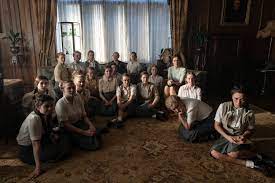 school? All the young women there are Germans. And not just ordinary Germans, but the daughters and granddaughters of the Nazi elite.
school? All the young women there are Germans. And not just ordinary Germans, but the daughters and granddaughters of the Nazi elite.
Mr Miller knows all about this before he arrives. He’s a British spy on a secret mission: to find out what’s going on behind closed doors. But when his handler, a Colonel, is assassinated before his very eyes, things get dangerous. He’s blamed for the killing, labeled a German spy, and has no way to contact headquarters to clear his name. Meanwhile, German sympathizers are everywhere — who can he trust? Europe is on the brink of war, and something major is about to happen to the girls in the  academy. Can Miller free himself, save the girls, and stop the German war effort? Or is he doomed to failure?
academy. Can Miller free himself, save the girls, and stop the German war effort? Or is he doomed to failure?
Six Minutes to Midnight is an enjoyable WWII thriller. It’s filled with classic skullduggery, like hidden cameras, double crossers and political intrigue. Eddie Izzard and Judi Dench are good, along with James D’Arcy as a police captain, Jim Broadbent as a bus driver, plus a bevy of talented German and Swiss actresses.
I guess I’m a sucker for British historical dramas, but… they do them so well!
Dir: Shaka King
It’s the summer of ’68 in Chicago. Fred Hampton (Daniel Kaluuya) is the young local head of the Black Panther Party. They supply meals for poor kids and plan to open a medical centre. He takes up with Deborah (Dominique Fishback) a young idealistic poet. Fred is also known for his rabble-rousing speeches, done without a mic, calling for revolution, instead of just posturing: Political power doesn’t flow from the sleeve of a dashiki, he says. You have to do something, don’t just talk about it. Because 1968 is a time of change, with the war in Vietnam, the Democratic convention, and massive marches and demos going on in downtown Chicago.
Naturally, J Edgar Hoover and the FBI don’t like it at all. They label the Panthers “dangerous extremists” and decide to go all out to stop them, with their notorious and illegal operation known as  COINTELPRO. They plan to infiltrate, jail or kill the Panthers, whom they call a subversive criminal group.
COINTELPRO. They plan to infiltrate, jail or kill the Panthers, whom they call a subversive criminal group.
Meanwhile, there’s Wild Bill O’Neal (LaKeith Stanfield) a petty grifter and car thief who poses as an FBI agent to rob other blacks. He’s caught, threatened with prison or worse, and forced to work as a rat for the FBI. It’s a carrot and stick operation. His handler, Roy Mitchell (Jesse Plemons), possibly  the whitest guy in the world, shares the wealth — cigars, expensive alcohol, and envelopes of cash. He just has to betray the panthers, incite violence, and draw maps of their headquarters for illegal break-ins and assassinations.
the whitest guy in the world, shares the wealth — cigars, expensive alcohol, and envelopes of cash. He just has to betray the panthers, incite violence, and draw maps of their headquarters for illegal break-ins and assassinations.
Judas and the Black Messiah is a fantastic historical dramatic thriller about major social movements and the the US government’s attempt to stop it. The title suggests it’s about two clashing forces, Hampton and O’Neal, the revolutionary and the traitor, facing off. But actually they seldom interact. It’s actually a story divided into two points of view, the FBI, and the Black Panther Party. It’s full of stuff I hadn’t heard about — things like Hampton organizing working-class whites, Puerto Ricans and Blacks in order to form a united front based on class, not race. Kaluuya and Stanfield were in the movie Get Out together and they’re both unrecognizable; they totally get into their roles here. It’s an important issue told in a cinematic way… and it’s nominated for for academy awards this year.
Great movie.
Nobody and Six Minutes to Midnight are available starting today, and Judas and the Black Messiah is coming soon.
This is Daniel Garber at the Movies, each Friday morning, on CIUT 89.5 FM and on my website, culturalmining.com
Time. Films reviewed: Anthem of a Teenage Prophet, Jordan River Anderson: The Messenger, Pain and Glory
Hi, this is Daniel Garber at the Movies for culturalmining.com and CIUT 89.5 FM.
Time is malleable. This week I’m looking at three examinations of time. There’s a Spanish drama about a director reclaiming his past, a YA drama about a teen who can see the future, and a documentary about the present-day problems of indigenous, special-needs kids.
Dir: Robin Hays
It’s 1997 in small-town Stokum, Michigan. Luke (Cameron Monaghan) is a highschooler in small town. He’s into skating, music and art. He lives with his straightlaced dad and flaky mom (Juliette Lewis). He used to climb towers with the tall and wiry Fang (Grayson Gabriel) his best friend since kindergarten, but they had a falling out. Now he’s hanging with Stan, a popular B-ball jock, and Stan’s girlfriend Faith (Peyton List). But everything changes when he follows Stan to a party at Fang’s place. After lots of drinking and  smoking, Luke has a vision: Someone will be killed in the morning in a hit-and-run just outside their school. They dismiss this as a stoner daydream, but record it on video, just for fun. And sure enough, best friend Stan winds up dead, exactly as predicted.
smoking, Luke has a vision: Someone will be killed in the morning in a hit-and-run just outside their school. They dismiss this as a stoner daydream, but record it on video, just for fun. And sure enough, best friend Stan winds up dead, exactly as predicted.
Eyewitness news picks up the story and soon there are media trucks parked out on his front lawn. He’s stared at at school, and somehow blamed for Stan’s death. Only Faith stands up for him. Will his prophetic dreams continue and can he use it to save people from dying?  Are Faith and Luke just mourning Stan or is their something more between them? And what happened between Luke and Fang that soured their friendship, and will they ever make up?
Are Faith and Luke just mourning Stan or is their something more between them? And what happened between Luke and Fang that soured their friendship, and will they ever make up?
Anthem of a Teenage Prophet is based on a popular YA novel, and holds many of its standard features: rudderless youth looking for meaning, potential love story, friendship, bullying, and prejudice; and a hint of the supernatural. And it’s set in the late 90s, a world of Thrasher, Mortal Combat, white rap and ironic T-shirts. Beautiful scenery (it was actually shot in BC) nice soundtrack and credible acting, Anthem is a good, though not great, teen movie.
 Jordan River Anderson, The Messenger
Jordan River Anderson, The Messenger
Dir: Alanis Obomsawin
Norway House is a beautiful Cree community in northern Manitoba. But, due to pregnancy complications, little Jordan River Anderson was born in a Winnipeg Children’s Hospital. There he received constant attention from doctors, therapists and experts helping the boy communicate and understand what was going on around him. He was partially paralyzed, could not speak and breathed using a respirator. But he could only spend limited time with his parents and family since he needed constant care. Most special-needs kids are eventually sent from hospital to their parents home or a halfway house with caregivers  near to their family. But Jordan never left the hospital – he died there. Neither the province nor the federal government would put up the funds it required for the move, care and refurbishing.
near to their family. But Jordan never left the hospital – he died there. Neither the province nor the federal government would put up the funds it required for the move, care and refurbishing.
Why? Because he’s indigenous.
Enter Cindy Blackstock, a lawyer and social worker specializing in indigenous cases. She crafts a bill, The Jordan Principle, to ensure no child would be left unfunded to to intergovernmental disputes. It is passed unanimously in the House of Commons. Jordan’s Principle says that a child of need will be cared for by the first level of governmental contacted. All is well. Sadly no. Not a single kid is helped since it’s passage. The government budgets the funds to fight Jordans  Principle in court, but not a penny more in its budget to pay for care needed for indigenous special needs kids.
Principle in court, but not a penny more in its budget to pay for care needed for indigenous special needs kids.
Jordan River Anderson The Messenger is the sixth in a series of documentaries by Alanis Obomsawin, outlining the struggles between First Nations and the Canadian government since the founding of this country. It follows Blackstocks legal battles and the very personal stories, captured in photos and home videos, by Jordan and other indigenous families with special needs kids. This is a one-hour documentary that deals with a heartbreaking story, but one that ends on a hopeful note.
Photo of Alanis Obomsawin by Jeff Harris.
Wri/Dir: Pedro Almodovar
It’s present day Madrid. Salvador (Antonio Banderas) is a celebrated Spanish director at the peak of his career. He is looking back at his old notebooks, and letters, taking stock of his life. And he finds it miserable. His body is failing him, his creative well has gone dry. No sex, no love, no pleasure aside from swimming. But as he looks at his life two periods come back to him. As a child he lives with his mother (Penelope Cruz), who takes in laundry, and his father. They are forced to make their home in whitewashed caves, underground. But young Salvador (Asier Flores) is a precocious lad, singled out for his talent by a priest at his school. He teaches a  handsome teenaged bricklayer Eduardo (César Vicente) how to read and write. In return poses for a painting by Eduardo. Little Salvador idolizes Eduardo but doesn’t understand his feelings. With his parents now gone, what remains from his childhood?
handsome teenaged bricklayer Eduardo (César Vicente) how to read and write. In return poses for a painting by Eduardo. Little Salvador idolizes Eduardo but doesn’t understand his feelings. With his parents now gone, what remains from his childhood?
 The other period he reflects on is making his first movie in the early 1980s. It is being shown at the Cinematheque in Madrid, and they want him to appear alongside that films lead actor Alberto (Asier Etxeandia). The problem is Alberto is a heroin addict, hates Salvadors guts and they haven’t seen each other for more than thirty years, What was the scandal that led to such a long lasting grudge? Can it be mended? And who is the missing piece in that puzzle?
The other period he reflects on is making his first movie in the early 1980s. It is being shown at the Cinematheque in Madrid, and they want him to appear alongside that films lead actor Alberto (Asier Etxeandia). The problem is Alberto is a heroin addict, hates Salvadors guts and they haven’t seen each other for more than thirty years, What was the scandal that led to such a long lasting grudge? Can it be mended? And who is the missing piece in that puzzle?
Pain and Glory is a fantastic and fascinating autobiographical film by Pedro Almodover. It is  ostensibly fictional, the names have been changed, but is clearly based largely on Almodovars life. It plays with time, character and genre, flashing back to early times, and repeating short scenes with subtle differences. It starts with Salvador writing a book, but somewhere, secretly turns into him crafting a film, leaving the viewer to piece it together. Lush and colorful, moving and funny, Pain and Glory is an intricate recreation of Almodovars own life andwork.
ostensibly fictional, the names have been changed, but is clearly based largely on Almodovars life. It plays with time, character and genre, flashing back to early times, and repeating short scenes with subtle differences. It starts with Salvador writing a book, but somewhere, secretly turns into him crafting a film, leaving the viewer to piece it together. Lush and colorful, moving and funny, Pain and Glory is an intricate recreation of Almodovars own life andwork.
Pain and Glory starts today, and Anthem of a Teenage Prophet starts next Friday in Toronto; check your local listings; and Jordan River Anderson, The Messenger is one of many movies at ImagineNATIVE through Sunday.
This is Daniel Garber at the Movies, each Friday morning, on CIUT 89.5 FM and on my website, culturalmining.com.
Suburban types. Films reviewed: Eighth Grade, Under the Tree, Don’t Worry, He Won’t Get Far on Foot
Hi, this is Daniel Garber at the Movies for culturalmining.com and CIUT 89.5 FM.
Movies needn’t be about famous people. This week I’m looking at three domestic dramas about ordinary, suburban types. There’s a girl in 8th grade deciding what to do with her future, Icelandic neighbours fighting over a tree, and a quadriplegic alcoholic learning to draw.
Wri/Dir: Bo Burman
Kayla (Elsie Fisher) is a modern eighth grader who lives with her dad (Josh Hamilton). It’s the end of her last year of junior high and kids are looking at the time capsules they buried three years earlier, to see how much they’ve changed. On youtube and instagram she’s a success and she shares her thoughts on a vlog, ending each podcast with the word “Gucci”! But at school she’s the opposite of famous. She’s the kind of girl who shows up at a pool party in a little kid’s  one piece when the rest of the girls are wearing bikinis. Kayla has zits, she doesn’t understand fashion and has no friends.
one piece when the rest of the girls are wearing bikinis. Kayla has zits, she doesn’t understand fashion and has no friends.
The guy she’s crushing on, Riley, just wants sex. And popular girls – like the snobby Olivia – won’t even acknowledge she exists. But things look up when she’s invited to Olivia’s birthday party, and even better when a much older highschool girl agrees to be her mentor. Can Kayla create a new personality, make friends  and find a boyfriend? Or will high school just bring more of the countless humiliations a 12-year-old girl faces each day?
and find a boyfriend? Or will high school just bring more of the countless humiliations a 12-year-old girl faces each day?
Eighth Grade is a warm and funny coming-of-age story about a girl approaching — but not yet entering — adolescence. Elsie Fisher is totally believable in the lead role. And Bo Burman, the filmmaker, started as a youtube presence himself. The thing is, a lot of the movie feels like a stereotypical boy’s coming-of-age story superimposed on a girl. Things like: whenever Kayla  ogles her crush Riley she pictures him walking in slow motion to loud pop music, leaving her tongue-tied; or when her dad catches her masturbating to porn on her smartphone. (Also… what’s with all these single dad movies? In real life, 80% of single-parent families are headed by moms, not dads, but you wouldn’t know it.)
ogles her crush Riley she pictures him walking in slow motion to loud pop music, leaving her tongue-tied; or when her dad catches her masturbating to porn on her smartphone. (Also… what’s with all these single dad movies? In real life, 80% of single-parent families are headed by moms, not dads, but you wouldn’t know it.)
On the other hand this film deals with real contemporary issues – like consent, snobbery, bullying, sex-education and the very new, very real phenomenon of shooting drills; what kids should do if a shooter comes into the school.
Eighth Grade is a very cute and touching comedy, and one that’s worth seeing.
Dir: Hafsteinn Gunnar Sigurðsson
It’s suburban Iceland. Atli (Steinþór Hróar Steinþórsson) is a married guy with a three-year-old daughter, until… his wife catches him watching porn on his computer. Not only that, it’s him in the video, with his ex girlfriend. It’s not how it looks, he says. We made the tape years before I met you – I’ve never cheated on you. No, she says, that’s exactly how it looks,  and you’re out of here.
and you’re out of here.
He ends up at his parents’ house, a retired couple named Baldvin and Inga (Sigurður Sigurjónsson and Edda Björgvinsdóttir). The family is already dealing with the disappearance and presumed death of his brother. They  live in a big blue townhouse with a shady tree in the backyard. Inga has a silky cat, and Baldvin fills his free time with choir practice. They get along well with their neighbour – a divorced professional — but less so with his fitness-obsessed second wife. The shade from their tree interferes with her suntan. A small
live in a big blue townhouse with a shady tree in the backyard. Inga has a silky cat, and Baldvin fills his free time with choir practice. They get along well with their neighbour – a divorced professional — but less so with his fitness-obsessed second wife. The shade from their tree interferes with her suntan. A small  disagreement.
disagreement.
But just like Atli’s sex tape, little things left unchecked can grow into big problems. A series of unexplained incidents – slashed tires, salacious garden gnomes found in a planter, a missing cat – grow more and more dangerous. Can the  feuding neighbours settle their crisis? And will Atli move back home with his family?
feuding neighbours settle their crisis? And will Atli move back home with his family?
Under the Tree is a very dark comedy about life in contemporary Iceland . But don’t expect hotsprings and rustic fishing boats. It’s filled instead with classrooms, Ikea stores and government offices. The acting is excellent as the story progresses to its ultimate conclusion.
 Don’t Worry, He Won’t Get Far On Foot
Don’t Worry, He Won’t Get Far On Foot
Dir: Gus Van Sant
It’s the 1970s in the Pacific Northwest. John Callahan (Joaquin Phoenix) is a redhead who likes drinking and picking up girls. An adopted kid from small town Oregon he goes to California to sow his wild oats. But his life changes dramatically when a weekend bender ends with his car wrapped around a tree. He’s left quadriplegic, with little chance of recovery. But with the help of a Swedish caregiver named Annu (Rooney Mara), he learns to operate a wheelchair and eventually how to draw with one hand. His personality stays intact and so does his alcoholism.
So he joins a 12-step AA group held in a mansion. It’s hosted by Donnie (Jonah Hill) an irreverent rich gay man with long hair and beard. Donnie  always has time for his piggies what he calls the men and women he sponsors. And as John passes through the twelve steps of recovery he finds a meaning in life: drawing obscene, politically incorrect and hilarious cartoons.
always has time for his piggies what he calls the men and women he sponsors. And as John passes through the twelve steps of recovery he finds a meaning in life: drawing obscene, politically incorrect and hilarious cartoons.
Normally, if someone says a movie is about Alcoholic Anonymous meetings I’d say let me out if here. These kind of movies are both gruellingly depressing and painfully earnest. But this is a Gus Van Sant movie and he makes it work. This movie is funny, surprising, shocking and very enjoyable. Yeah, it’s sad at times, but it offers so much you rarely see. It’s  refreshing to see a movie that deals with the bad sides of living with a disability, just as it’s not afraid of celebrating a disabled person’s sex life.
refreshing to see a movie that deals with the bad sides of living with a disability, just as it’s not afraid of celebrating a disabled person’s sex life.
Joaquin Phoenix is brilliant as John, And Jonah Hill is great – and totally unrecognizable — as Donnie. Smaller roles like Jack Black as a drunk driver, Tony Greenhand as John’s caregiver and Kim Gordon, Udo Kier and Ronnie Adrian, as some of the piggies – keep the movie going, The film is  done cut-up style, jumping around over a 20-year period, which makes it a bit disorienting. Even so, it leads you feeling warm and fuzzy inside.
done cut-up style, jumping around over a 20-year period, which makes it a bit disorienting. Even so, it leads you feeling warm and fuzzy inside.
Eighth Grade, Under the Tree and Don’t worry, He Won’t Get far on Foot, all open today in Toronto; check your local listings.
This is Daniel Garber at the Movies, each Friday morning, on CIUT 89.5 FM and on my website, culturalmining.com.
Made for the Big Screen. Films reviewed: Suburbicon, Human Flow, Faces Places
Hi, this is Daniel Garber at the Movies for culturalmining.com and CIUT 89.5 FM.
Do you find it hard to keep up with all these Fall Film Festivals? Here’s some coming in November whose names are nearly self-explanatory: EstDocs shows documentaries from Estonia – This year is Estonia’s 100th anniversary since it first declared itself a republic. ReelAsian is one of Toronto’s biggest festivals, showing features from East and South Asia and their diasporas. And guess what Black Star shows? It’s a curated series of classics at TIFF featuring black movie stars: Dorothy Dandridge in Carmen Jones, Sidney Poitier in In The Heat of the Night, and Denzel Washington in Malcolm X.
This week I’m looking at some movies — a thriller and two art documentaries – with strong visual elements that deserve to be seen on the big screen. These films are about migrating across continents, driving across France… or just staying put in the suburbs,
Dir: George Clooney
It’s the late 50s in a cookie-cutter suburb. Nicky (Noah Jupe) is a twelve year old boy who lives with his mom and dad in a middleclass, white, Episcopalian home. His father, Mr Gardner (Matt Damon) works at a middle management office job, while his mom (Julianne Moore) stays at home. She uses a wheelchair to get around since she was almost killed in a car accident a year earlier. Her sister (also played by Juliane Moore) helps out around the house. Life is bland, suburban and normal.
Then two big things happen.
First, a middle class black family moves into the house behind theirs. This makes Nicky happy because they have a son his age– someone he can play baseball with. His all-white neighbours, though, didn’t like it one bit, and try to intimidate them into moving away. The second thing is a home invasion ![]() by a pair of lowlife criminals. They tie up the family to chairs at the dinner table and knock them out with ether. And when Nicky wakes up, his mom is dead and the killers are gone. Stranger still, his aunt quickly moves in to take her place and dyes her hair to look exactly like his real mom. What’s going on?
by a pair of lowlife criminals. They tie up the family to chairs at the dinner table and knock them out with ether. And when Nicky wakes up, his mom is dead and the killers are gone. Stranger still, his aunt quickly moves in to take her place and dyes her hair to look exactly like his real mom. What’s going on?
Then things get worse. White violence scalates against their new black neighbours escalates. A detective visits Gardner at his office investigating his wife’s murder. He’s suspicious. So is an insurance investigator. Then the killers themselves show up again making new demands. What do they want from ![]() him? When Nicky catches his Dad and his fake-mom in a compromising position on the pingpong table he realizes something is very wrong.
him? When Nicky catches his Dad and his fake-mom in a compromising position on the pingpong table he realizes something is very wrong.
Suburbicon is a zany — but violent – mystery/thriller that looks at the dark side of a 1950s suburb, as seen through the eyes of a little boy. It also deals with segregation, but that’s really just a subplot — an attempt to give it relevance. It’s written by Joel and Ethan Coen, with the usual over-the-top violence and absurdist comedy, but it doesn’t feel like a Coen Brothers movie. This is George Clooney’s work. Aesthetically, it’s amazing, with incredible art direction that brings to life a stylized version of suburban America.
It’s a fun story, but that’s all it is — entertaining fluff.
Dir: Ai Weiwei
Millions of people around the world are housed temporarily in makeshift shelters. These refugees flee their homes or villages in fear for their lives. Many more are migrating across borders looking for a place to call home, now that war or famine or poverty has made their previous homes uninhabitable. This human flow, these crowds of people risk their lives qs they walk through deserts, through fields and cities, crossing oceans in leaky boats, as they search for sanctuary.
This movie follows refugees and migrants around the world:  Rohingya in Bangladesh, Syrians walking through Europe, central Americans climbing those walls at the US/Mexican border. It takes us to Gaza, Kenya, Afghanistan, Turkey and Hungary, looking at how these people fare in unwelcoming environs.
Rohingya in Bangladesh, Syrians walking through Europe, central Americans climbing those walls at the US/Mexican border. It takes us to Gaza, Kenya, Afghanistan, Turkey and Hungary, looking at how these people fare in unwelcoming environs.
Human Flow is huge, epic in scope and very long for a documentary – almost 2 ½ hours. It takes you to different locations without any narrative or order, punctuated with  poetic quotes and info scrolling across the screen. There are some exciting parts — like the rescue of migrants in boats on the Mediterranean – but much of the film has a constant “flow”, just drifting to scene after scene. Ai Weiwei is primarily an artist so the filming is gorgeous and grandiose. It uses drone shots looking down from way, way up in the air where refugee camps look like tiny white pills arranged in neat rows. Then it zooms down, until you gradually see what looks like ants and then finally, real people with faces. Human Flow is visually stunning and informative.
poetic quotes and info scrolling across the screen. There are some exciting parts — like the rescue of migrants in boats on the Mediterranean – but much of the film has a constant “flow”, just drifting to scene after scene. Ai Weiwei is primarily an artist so the filming is gorgeous and grandiose. It uses drone shots looking down from way, way up in the air where refugee camps look like tiny white pills arranged in neat rows. Then it zooms down, until you gradually see what looks like ants and then finally, real people with faces. Human Flow is visually stunning and informative.
I just wish it were an hour shorter.
Faces Places (Visages Villages)
Agnes Varda is the Belgian-born artist and filmmaker who rose to fame in the French New Wave. JR is a contemporary artist known for his postering. He plasters his work — giant-sized, black and white paper photos – onto outdoor walls. Together they travel across France taking pictures of ordinary people they meet on their way: a coal miners daughter, a waitress, a farmer, and a woman who raises goats. They also pay homage to  important figures from Agnes’s past: a man who modeled for her on the beach, the grave of photographer Cartier-Bressson, and Jean-Luc Godard’s home.
important figures from Agnes’s past: a man who modeled for her on the beach, the grave of photographer Cartier-Bressson, and Jean-Luc Godard’s home.
They make strange pair. Agnes is short, with a pageboy haircut, her white hair partly dyed with a red halo around the fringe. She’s 88. JR is tall and lanky. He won’t reveal his real name and keeps his face disguised with a fedora and dark glasses. He’s 33. They travel in JR’s little truck that has the image of a  camera lens on the side. It functions as a photobooth that prints out the huge paper photos he take. And Agnes films it all, recording the process and people’s honest reactions to JRs art. The posters might wash off of walls by the next high tide , but they will remain longer on film.
camera lens on the side. It functions as a photobooth that prints out the huge paper photos he take. And Agnes films it all, recording the process and people’s honest reactions to JRs art. The posters might wash off of walls by the next high tide , but they will remain longer on film.
Faces Places is a delightful personal documentary about art and photography, both still and in motion. It shows us the transience of people and images.
Human Flow is now playing, and Suburbicon and Faces, Places open today in Toronto; check your local listings.
This is Daniel Garber at the Movies, each Friday morning on CIUT 89.5 FM and on my website culturalmining.com.
Love vs Sex. Movies reviewed: The Best of Me, White Bird in a Blizzard PLUS TIFF Cinematheque Free Screen
 Hi, this is Daniel Garber at the Movies for culturalmining.com and CIUT 89.5 FM, looking at high-brow and low-brow movies, indie, cult, foreign, festival, documentary, genre and mainstream films, helping
Hi, this is Daniel Garber at the Movies for culturalmining.com and CIUT 89.5 FM, looking at high-brow and low-brow movies, indie, cult, foreign, festival, documentary, genre and mainstream films, helping you see movies with good taste, movies that taste good, and how to tell the difference.
you see movies with good taste, movies that taste good, and how to tell the difference.
Some things in life are free.
TIFF Cinematheque has a program of experimental and avant-garde film called Free Screen. The fall season opens tonight featuring, new films by Canadian director  Barbara Sternberg and work by Cliff Enns. Both fimmakers will be at the screening. These art films are shot with unusual techniques. Sternberg uses rotoscope animation (that’s projected photographic images traced and redrawn, frame-by-frame, into animation). Enns’ film uses Fisher-Price PixelVision, a 1980s B&W toy video camera. Very cool and aesthetically pleasing stuff. For details go to tiff.net/cinematheque.
Barbara Sternberg and work by Cliff Enns. Both fimmakers will be at the screening. These art films are shot with unusual techniques. Sternberg uses rotoscope animation (that’s projected photographic images traced and redrawn, frame-by-frame, into animation). Enns’ film uses Fisher-Price PixelVision, a 1980s B&W toy video camera. Very cool and aesthetically pleasing stuff. For details go to tiff.net/cinematheque.
This week, movies about about “free” things, like love, friendship and family.
There’s a teary, romantic drama about lovers torn apart in the bayous of Louisiana, and a mystery drama about a disappearing mama in a 1980s suburbia.
 The Best of Me
The Best of Me
Dir: Michael Hoffman (based on the Nicholas Sparks novel)
Dawson Cole is a shy kid at a Louisiana High School. He likes science and is good at fixing things — like cars. And when he helps his perky classmate Amanda with car trouble, sparks fly. She invites him on a date. The problem? Amanda is rich and popular, while Dawson comes from the wrong side of the tracks. He’s a member of the notorious Cole clan, under 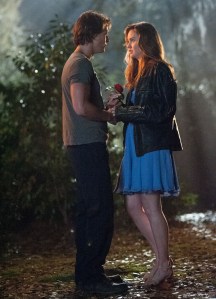 the sway of his evil daddy and his two mean brothers. Most kids sneak alcohol or contraband past their parents. Not in this family: he gets punished for sneaking homework into their shack when he should be getting drunk and playing cards with his pappy! You think you’re better than us? You ain’t better than us, you’re white trash and don’t you forget it! Daddy beats him up so he runs away. And misses the first date.
the sway of his evil daddy and his two mean brothers. Most kids sneak alcohol or contraband past their parents. Not in this family: he gets punished for sneaking homework into their shack when he should be getting drunk and playing cards with his pappy! You think you’re better than us? You ain’t better than us, you’re white trash and don’t you forget it! Daddy beats him up so he runs away. And misses the first date.
He ends up in the garage of an old man named Tuck, who takes pity on the good kid from the bad family. Dawson and Amanda stare into each others’ limpid eyes by the  Spanish moss, ‘neath the twinkling stars. He picks a red rose…they have their first kiss. Together they spin plans for an idyllic future… until an unexplained event splits them apart.
Spanish moss, ‘neath the twinkling stars. He picks a red rose…they have their first kiss. Together they spin plans for an idyllic future… until an unexplained event splits them apart.
Decades later, they meet again in their small town, after the death of a mutual friend. Dawson works as a roughneck now on an oil rig in the Gulf. Amanda is a housewife with a weasel-y, unloving husband. She adores her teenage son but he’s heading off to college. Though both are haunted by sad memories, can they rekindle their romance? Or are they just captives of class and destiny, never to  love again?
love again?
Dawson and Amanda are played by two sets of actors. Luke Bracey (he co-starred in the recent action thriller November Man) and Liana Liberato play the dewy-eyed teens. She’s the fiery, sharp-tongued one matched with his strong and silent type. Grown-up heartthrobs James Marsden and Michelle Monaghan play the same characters as adults, but more wistful and filled with regret.
This movie is a totally weepie romance. It’s got everything you expect: true love – unrequited; innocent teens burdened with their families’ prejudices; and passions left to smolder for decades. Total cheese, clichés, and stock charicatures. What’s its point? To tug at your heartstrings and make you cry. It’s a weeper. And I did. Not my cup of tea, but if you’re into classic romances, this one does it right, serving up love on a silver platter in the deep, deep South.
 White Bird in a Blizzard
White Bird in a Blizzard
Dir: Gregg Araki (Based on the novel by Laura Kasischke)
It’s the 1980s – that means kids have big hair and wear bright colours that don’t match. Kat (Shaileen Woodley) has an OK suburban family, taken directly from a TV sitcom. Mom’s a glamorous model-type (French actress Eva Green) who always puts her down. Hapless Dad (Law and Order’s Christopher Meloni) is a total loss – he looks like John Cleese on Fawlty  Towers (complete with bad moustache and receding hairline, but without the witty repartee.) Kat hangs with her two best friends – both self-described fat chicks. One’s black the other a skinny gay
Towers (complete with bad moustache and receding hairline, but without the witty repartee.) Kat hangs with her two best friends – both self-described fat chicks. One’s black the other a skinny gay  guy, who has a “fat chick deep inside”. Kat self-identifies too, even though she recently lost weight and grew breasts, She discovers sex and can’t wait to try it out with Phil, the good-looking chowderhead next door. Phil lives with his nosey blind mom.
guy, who has a “fat chick deep inside”. Kat self-identifies too, even though she recently lost weight and grew breasts, She discovers sex and can’t wait to try it out with Phil, the good-looking chowderhead next door. Phil lives with his nosey blind mom.
Then suddenly Kat’s mom disappears and her life starts to change. Did she run away and abandon her family? Is she coming back again? Or is she dead? She is  haunted by dreams – her mom and other people appearing in blinding white snowdrifts. She sees a therapist (Angela Basset) and talks with the police – one detective in particular. She’s crushing on him, and tries to seduce him. Meanwhile she follows the clues like an amateur detective, to find out what happened to her mother. Her boy-next-door boyfriend Phil seems to have flirted with her mom! Does he know where she is? Even her dad seems to have a secret to hide… What’s going on?
haunted by dreams – her mom and other people appearing in blinding white snowdrifts. She sees a therapist (Angela Basset) and talks with the police – one detective in particular. She’s crushing on him, and tries to seduce him. Meanwhile she follows the clues like an amateur detective, to find out what happened to her mother. Her boy-next-door boyfriend Phil seems to have flirted with her mom! Does he know where she is? Even her dad seems to have a secret to hide… What’s going on?
Gregg Araki is known for his stylized indie films, that offer a queer look at coming-of-age and sexual awakening in the suburbs. He’s good about shifting sexual and ethnic mixtures. This one fits his style, with an attractive cast, a quirky main actress, and lots of sex, nudity, music and nostalgic looks at the counter-culture. It doesn’t quite hold together. It jumps from painfully wooden family tableaux, to fresh and realistic portrayals of 80s youth culture. Are they part of the same movie? The acting ranges from the dreadful (Meloni) to great (Woodley and Gabourey Sidibe as her BFF). Still, White Bird in a Blizzard is pleasant to watch, with a great ambient soundtrack, and a few whopper surprises.
The Best of Me opens today, and White Bird in a Blizzard starts next week in Toronto. Check your local listings.
This is Daniel Garber at the Movies, each Friday morning on CIUT 89.5 FM and on my website culturalmining.com
Daniel Garber talks with director Sean Garrity about his new film BLOOD PRESSURE
 What would you do if you lived in house with your husband and two kids… and you suddenly started getting letters from a secret admirer?
What would you do if you lived in house with your husband and two kids… and you suddenly started getting letters from a secret admirer?
Letters from someone who seems to know you better than your own family… And what would you do if they could almost read your mind? If they cared about you? And what if they asked you to do something that might be taboo, or maybe immoral, or possibly… illegal?
Would you be thrilled? Intrigued? Scared? Indifferent?
An unusual new movie, a dramatic, psychological thriller asks just these questions. It’s called Blood Pressure, and it’s directed by a well-known Canadian filmmaker from Winnipeg. (The movie opens today in Toronto.)
Director Sean Garrity talks about how the film’s story developed, whether it’s a thriller or a family drama, an identifiable Winnipeg style, his run-in with government censorship… and more!
Scary and Scarier. Movies Reviewed: Dark Skies, Act of Killing PLUS Oscar predictions
Hi, this is Daniel Garber at the Movies for culturalmining.com and CIUT 89.5 FM, looking at high-brow and low-brow  movies, indie, cult, foreign, festival, documentary, genre and mainstream films, helping you see movies with good taste, movies that taste good, and how to tell the difference.
movies, indie, cult, foreign, festival, documentary, genre and mainstream films, helping you see movies with good taste, movies that taste good, and how to tell the difference.
Oscar is back – and I’m not talking about Pistorius the Paralympics star’s trial. This weekend, the good and the bad compete for the most important prizes in the industry.
So, once again I will make my Oscar predictions – but a warning: I’m almost always completely wrong.
I have a feeling Amour, Haneke’s devastating film about the final years of an elderly couple, will come out on top. Zero Dark Thirty – the CIA torture-fest about the hunt for Bin Laden – will be largely shut out. And Silver Linings Playbook, the bi-polar rom-com, and Argo, a light, revisionist history about the Iranian hostage crisis, will divide the rest if the spoils.
Best Movie: Amour should win, but Argo will win. Best Actor: I haven’t seen Lincoln yet, so I can’t judge Daniel Day Lewis, but of the other four, Joaquin Phoenix did the best performance. He should win. Best Actress: Emmanuel Riva should and will win. Supporting actor? Robert De Niro in Silver Linings should win, but Christopher Waltz will win. Supporting actress: I liked Amy Adams in The Master, but I think Anne Hathaway will win. I think Michael Haneke will win best director and he deserves it.
The documentaries are all fantastic. I have a feeling Looking for Sugarman will win. And the foreign language films this year – Rebelle, No, Amour, Kon Tiki (plus Royal affair, which I haven’t seen) – are all outstanding. Three of them are on my 2012 best ten list, and No would be as well, if it had been released in time. You should see them all. And finally best original and adapted screenplays: I think Amour and Silver Linings will win that.
Some of the Oscar choices are scary, and so are their song and dance numbers. Even scarier are two movies: a Spielberg-style family thriller-chiller, and an unbelievably strange documentary out of Indonesia.
Dir: Scott Stewart
It’s a hot summer, and the fourth of July is a couple days away. In the best of times, the Barrets are not a perfect family. Mom and Dad (Keri Russel and Jeff Hammond) are in trouble: their mortgage payments are three months overdue. Daniel’s out of work, and Lacey’s real estate sales aren’t doing well. Then there’s their two kids, Jesse and Sam (Toronto-native Dakota Goyo and Kadan Rockett). Jesse is hanging out with an older, “bad” friend, Ratface, who introduces him to long guns, bong-smoking and vintage porn videos (Jesse’s 14.) They hang out in one of the fixer-upper houses Lacey’s trying to sell. And little Sam is having nightmares – the sandman keeps coming to him at night. Still, the family likes their nice suburban neighbourhood, with its swimming pools, American 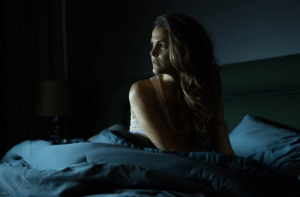 flags and backyard barbecues and don’t want to move. Jesse calms the waters by staying up late, talking to Sam by walkey-talkey.
flags and backyard barbecues and don’t want to move. Jesse calms the waters by staying up late, talking to Sam by walkey-talkey.
But things go from bad to worse. Birds smash into the windows. The family starts having absence seizures, wetting their pants, and walking into walls. Strange bruises and marks are appearing on the kids’ bodies – is someone calling Children’s Aid? They open their mouths wide and start screaming, like in Invasion of the Body Snatchers. They wake up in the middle of the night to find strange, little tricks left behind by a Poletrgeist-like being. And humming sounds and bright white lights appear under doors, just like in ET and Close Encounters. (Get the picture?)
 Dad is perturbed, so he puts video camera in all the rooms to see of there is any Paranormal Activity at night. And sure enough, he finds something… but what are they? Can they fight off the enemy and keep together as a family unit? Or will they disappear, one by one?
Dad is perturbed, so he puts video camera in all the rooms to see of there is any Paranormal Activity at night. And sure enough, he finds something… but what are they? Can they fight off the enemy and keep together as a family unit? Or will they disappear, one by one?
I love the pseudo-retro quality of the movie as they plunder all the scary movies from 70s and 80s. The kid actors are all great, and the adults are usually good. And there are some wicked semi-psychedelic dream sequences popping up all through the movie. They almost make the whole film worthwhile. Almost.
But the story is a mess, some of the characters are lame, and the dialogue waivers between good to chokingly awful. So even though I felt like I should like this kind of film – it was really disappointing, especially the ending. It almost feels like they ran out of money before they could rewrite flubbed dialogue, and re-shoot missing scenes, and just decided to release it half edited. Too bad.
Dir: Joshua Oppenhemier (and another director remains anonymous)
This is one of the weirdest documentaries I’ve ever seen, and has to be seen to be believed. Apparently, a group of former militants from Sumatra, Indonesia, decide to produce a fun, action film portraying the torture and murders it carried out in the 1960s. And they want to play themselves and their victims on the original sites where they murdered them. But they want to make it enjoyable, so they add musical numbers, dancing girls, a man in drag (one of the killers) for comic relief, and all sorts of additions to make it “entertaining”.
Historical context: In 1965-66, there were riots and mass-killings of about half a million ethnic Chinese Indonesians and Communist Party members in the mid-sixties around the fall of President Sukarno.
Those killers are still associated with a paramilitary security force and right-wing political group there which proudly  recalls their deeds to the locals.
recalls their deeds to the locals.
This is simultaneously the western filmmaker’s a first-hand record of the mass murderers unapologetically admitting their war crimes, and a film-diary of a bizarre low-budget Indonesian pop production. Jaw-dropping film.
Dark Skies opens today, check your local listings; Act of Killing is playing at the Human Rights Watch film festival in Toronto – go to tiff.net for details; and the Academy Awards are on TV this Sunday. Also opening tonight in Toronto is the very cool, experimental film Tower, directed by local Kazik Radwanski, who I interviewed last week. Check that one out.
This is Daniel Garber at the Movies, each Friday morning on CIUT 89.5 FM and on my website, culturalmining.com .

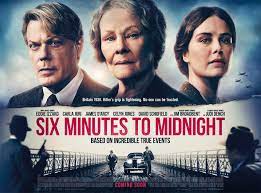
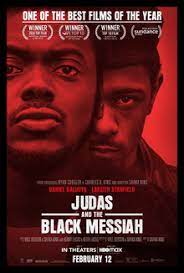
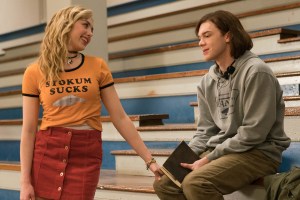
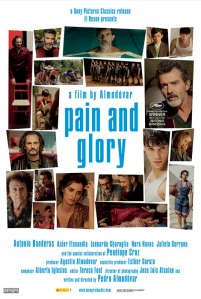

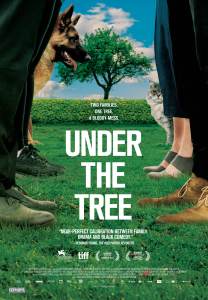
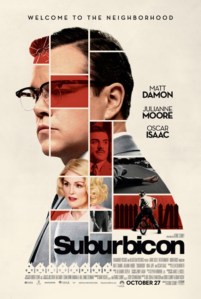
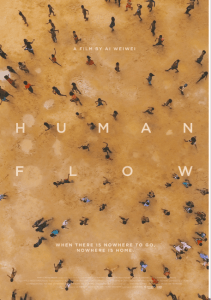

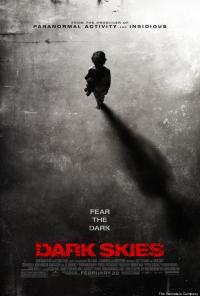

leave a comment